
|
![]()
Greatest Films of the 1950s
1950 | 1951 | 1952 | 1953 | 1954 | 1955 | 1956 | 1957 | 1958 | 1959
Title Screen Film Genre(s), Title, Year, (Country), Length, Director, Description 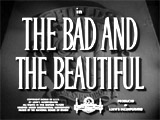

The Bad and the Beautiful (1952), 116 minutes, D: Vincente Minnelli
Director Vincente Minnelli's acerbic and scathing show-business related melodrama and dark expose of sordid backstage Hollywood was one of many films about Hollywood (such as Sullivan's Travels (1941) and Sunset Boulevard (1950)). It was based on scriptwriter Charles Schnee's Oscar-winning adaptation of George Bradshaw's short story "Memorial to a Bad Man," that told about a scheming film producer. It won five of its six Oscar nominations. In the film's opening, most of the main characters (an actress, a writer, and a director) were gathered together in the office of film studio executive and "B" picture producer Harry Pebbel (Walter Pidgeon) at the old Shields Studio: director Fred Amiel (Barry Sullivan), star actress (originally a rehabilitated drunk) Georgia Lorrison (Lana Turner), and widowed, award-winning Southern novelist-screenwriter James Lee Bartlow (Dick Powell). After all three had furthered their careers and had become successes - they had one thing in common - all of them had earlier been manipulated and ruthlessly victimized by ambitious, cruel, driven, amoral, and egotistical film producer Jonathan Shields (Kirk Douglas); but now they had been asked to join the despised but irresistible Shields on his next production and film project, but each of them hated him for different reasons. In flashback, the viewpoints and pasts of Shields' three former associates were told, detailing how he had betrayed, double-crossed, and caused them emotional pain; they all disowned him and hoped that he would fail in the future. In the first flashback, Shields was shown as beginning his ruthless and opportunistic rise to power as a maker of quickie, low-budget westerns and horror films; Shields had tricked Harry Pebbel (and his production unit) into hiring him as a producer, while Fred Amiel directed several "B" movies; as time went on, Shields began to substitute his own ideas, and then in a picture written by Amiel, Shields double-crossed him, chose a different more famous director, Von Ellstein (Ivan Triesault), and stole his idea. In the second flashback, the daughter of a famous Hamlet stage actor, Georgia Lorrison (Lana Turner), was a drunk until Jonathan Shields rehabilitated her and made her a movie star; unfortunately, she fell in love with Shields, and thought he loved her in return. Following the premiere of her debut performance in his film, movie star Georgia entered the producer's mansion with a giant bottle of champagne to celebrate - and then Georgia shockingly discovered she had been betrayed by producer Jonathan's affair with starlet magazine cover-model Lila (Elaine Stewart). Jonathan delivered a hateful diatribe against the very vulnerable Georgia - viciously lashing out and berating her. In the subsequent, incredible freak-out scene following Georgia's suicidal reaction to Jonathan's insults - she ran from the luxury mansion, entered her car, recklessly drove off in a raging downpour, spun out of control, slammed on the brakes (an inset close-up of her high-heeled shoe) and screamed, as her automobile lurched and hurtled around and finally came to rest on the side of the road. In the third flashback, young college professor and novelist James Bartlow was brought to Hollywood with his faithless, flirtatious southern belle wife Rosemary (Oscar-winning Gloria Grahame), to adapt his latest best-selling book into producer Shields' film; to get Bartlow's distracting wife out of the way, Shields paired her up with Latino actor Victor "Gaucho" Ribera (Gilbert Roland) to take a romantic trip to Mexico; the entire affair ended in tragedy when their private plane crashed and both were killed. After Shields decided to take over the direction of the film (his first directorial effort), it became a disaster - the studio went bankrupt and he lost the studio. The final scene was of director Amiel, actress Georgia and screenwriter Bartlow eavesdropping together on one telephone receiver - listening to the trans-atlantic conversation between Pebbel and the exiled Shields calling from Paris three years later - should they help him or not?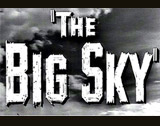


The Big Sky (1952), 140 minutes, D: Howard Hawks
Director Howard Hawks' least-known adventure-western (his second), a slow-moving episodic story, was based upon A.B. Guthrie Jr.'s best-selling 1949 novel of the same name and scripted by Dudley Nichols. Its beautiful black and white cinematography showcased the grandeur of Grand Teton National Park, and the camaraderie of men heading into frontier territory danger. In 1832, frontiersman-trapper Jim Deakins (Kirk Douglas) partnered with racially-prejudiced, impetuous drifter Boone Caudill (Dewey Martin), a brawling fugitive who had been falsely accused of a crime. Becoming friends, they continued together to St. Louis. After Boone and Jim were jailed for instigating a barroom brawl with Missouri River Company owner Sam Eggleston (Fred Graham) and some of his workers, they encountered a cellmate - alcoholic, grizzled, old-timer trapper Zeb Calloway (Arthur Hunnicutt) (a half-Indian and Boone's uncle) - the film's narrator. The group of jailbirds was bailed out by 'Frenchy' Jourdonnais (Steven Geray), the owner of a keelboat (named 'Mandan'), who paid their fines and immediately hired them for a fur-trading expedition 2,000 miles into the "wild and unexplored" upper Missouri River (and Yellowstone River) - a territory of threatening Blackfoot Indians. 'Frenchy' had brought along young Indian princess-female Teal Eye (Elizabeth Threatt, a half-Cherokee in her sole film), the daughter of a Blackfoot chief, to negotiate with the Indians at their destination and establish fur trade with them - in competition with the Missouri River Company. The expedition's journey was plagued by dangerous white water rapids, competing rival fur traders headed by ruthless company boss Louis MacMasters (Paul Frees) and led by mercenary saboteur Streak (Jim Davis), and a deadly attack by hostile Crow Indians on the warpath. Once the expedition reached its destination, Teal Eye escaped to her tribe and to her father Blackfoot Chief Red Horse (Theodore Last Star), and then summoned the tribe to greet the keelboat. Meanwhile, a rival love triangle had obviously developed between Teal Eye, Jim and Boone. Zeb watched as Teal Eye approached the two men and gave Jim a gift - regarding him and loving him like "an adopted brother," while at the same time making romantic gestures toward Boone. As Boone later exited her teepee to the noisy sounds of a tribal ceremony, Zeb announced to him: "You're a married man now." Boone was obligated to negotiate with Teal Eye's father to purchase her - as was the local custom, so that he would be free to leave with her. However, as plans were made to travel southward down-river back to St. Louis; Boone chose to leave with the other men and left Teal Eye standing on the shore. In the film's final moments during camp the first evening, Boone changed his mind and decided to return to the Indians to be with Teal Eye and to live with her amongst the Blackfoot.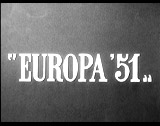
Europa '51 (1952, It.) (aka Europe '51), 113 minutes, D: Roberto Rossellini
Roberto Rossellini's evocative and bold post-war, social-realism film was his second collaboration with his American wife/actress Ingrid Bergman, following Stromboli (1950, It.). At the time of filming, their marriage faced considerable controversy due to Bergman's adulterous decision to leave her husband and daughter for Rossellini. Due to some of the film's controversial elements, it was severely edited (or censored) by the Italian government. The plot told about wealthy Irene Girard (Ingrid Bergman), an American living in Rome. Intense guilt and grief followed the suicidal death of her sensitive-minded, troubled, 12-year old son Michele Girard (Sandro Franchina) (who felt neglected by his mother). After deliberately falling down their apartment stairwell before a dinner party, in order to get his mother's attention, the boy died soon after due to complications related to his fractured hip. Before his death from a blood clot in the hospital, Irene cared for him - remembering when she truly bonded with and protected her son when they hid together during WWII's blitzkrieg bombings. Her boy's catastrophic death caused her to become depressed, and to realize that her shallow, self-absorbed socialite life (a bourgeois worldly existence) needed to change and she must embrace all those in need with love ("We have to change our lives!"). With the urgings of her socialist-leftist journalist cousin Andrea Casatti (Ettore Giannini), Irene went on a humanitarian, metaphysical crusade to find redemption. She became dedicated to helping those who were less fortunate, ill, suffering unnecessarily and living in slums. At first, she provided money to help a family with crippling medical bills for their young son. She also became a charitable do-gooder for dying, tubercular streetwalker Ines (Teresa Pellati), other exploited workers in soul-crushing assembly-line jobs, and an unmarried, impoverished single mother named Giulietta (Giulietta Masina) with six children in Passerotto. Due to her frequent absences, her affluent industrialist husband George Girard (Alexander Knox) jealously suspected that she was having an affair with Andrea, and also urged a doctor to declare her mentally-unbalanced. Her husband (and others) believed that she went too far when she aided a delinquent young thief (after a failed robbery and killing) to escape from the authorities, by freely letting him go ("Turn yourself in. I know you'll do it"). Irene's husband decided to have her permanently institutionalized and committed to an asylum-sanitarium for abandoning her family life and friends. The film asked whether she should be condemned or not: Was she truly insane, or a patron-saint missionary (such as St. Francis) on an extreme, self-sacrificing quest?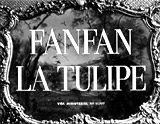



Fanfan la Tulipe (1952, Fr./It.) (aka Fearless Little Soldier, or Fan-Fan the Tulip), 102 minutes, D: Christian-Jaque
This charming, light-hearted and entertaining swashbuckling adventure film and romantic costume drama was set in mid-18th century France during King Louis XV's (Marcel Herrand) reign. The film's anti-war narrator (Hiram Sherman) began the crowd-pleasing film with the droll comment: "His Majesty's soldiers found this war so pleasant that they made it last seven years." Young, devil-may-care, lazy Parisian peasant Fanfan la Tulipe (Gérard Philipe) was forced to evade a forced marriage to Marion (Irène Young) - the pretty daughter of an outraged provincial farmer, after being caught sleeping with her on a haystack. On his forced march to the altar, the roguish and witty young seductive womanizer was convinced to join the military after voluptuous gypsy girl Adeline (Gina Lollobrigida in a star-making role) caught his eye with a low-cut peasant outfit. She facetiously told him during a fortune-telling palm reading that he would fulfill his fateful destiny and achieve fame in the military and possibly take the king's daughter Princess Henriette (Sylvie Pelayo) as his wife in a royal wedding ("You'll find glory in France's best regiment...The king's daughter loves you....And you'll marry her"). Adeline successfully duped Fanfan and he was recruited to serve in the French army in the midst of the Seven Years' War. He then learned that Adeline La Franchise was a phony charlatan who had tricked him - she was the daughter of his recruiting Sergeant officer - Captain of the Guard La Franchise (Nerio Bernardi), and had faked her prophesy to enlist the gullible Fanfan into the depleted ranks, for a recruiting bonus. However, Fanfan still believed in Adeline's prophesy: ("She predicted what I already knew...My destiny will be as you foretold and as I decided. I'll marry the king's daughter, when it suits me"). While Fanfan was on his way to basic training, the sword-wielding, boyish recruit came to the rescue of the caravan of Princess Henriette, being escorted by La Marquise de Pompadour (Geneviève Page), when they were attacked by highwayman bandits. She gratefully kissed him for saving him from the brigands, and the Marquise rewarded Fanfan with a bejeweled tulip (to provide him with his emblematic floral nickname), to provide him with good luck: "Take this tulip in memory of me and may it bring you luck." Fanfan deserted from the military, and forced his way into the King's palace to meet the Princess. He was captured, imprisoned, and sentenced to death for desertion, trespassing, forcible entry and disturbing the peace, but then pardoned and released (for having rescued Henriette earlier: "He once risked his life to rescue Henriette and myself. It's our turn to return the good deed"). Entering into a love triangle, Fanfan found he was falling in love with Adeline, who also loved him. Resistant and unwilling, Adeline had been approached by the smarmy King Louis XV: ("Adeline's charms caught the king's eye"). She slapped the King and wouldn't yield to his unwelcome advances - and she was forced to flee to a convent and go into hiding. Meanwhile, Fanfan also found himself the object of the King's jealous anger, and during his attempted rescue of Adeline, he defeated the enemy and captured its supreme commander ("We won without firing a single shot"). He was handsomely rewarded by the grateful King with marriage to Adeline - thus fulfilling her earlier predicted prophesy: ("You expressed the desire to wed your King's daughter, as predicted. You weren't deceived. I offer you my daughter's hand. It is my pleasure to lend a hand to providence. I give you my adopted daughter, Adeline La Franchise. She is worthy of you. She bravely held off all assaults on her beauty").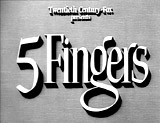


Five Fingers (1952) (aka 5 Fingers), 108 minutes, D: Joseph L. Mankiewicz
Michael Wilson's completed screenplay, thoroughly revised (uncredited) by the film's newly-appointed director Joseph L. Mankiewicz, was based upon L.C. Moyzisch's novel Operation Cicero. The fictionalized book (and subsequent semi-documentary spy-thriller film) was an account of how German Nazi intelligence officers during WWII were sold copies of the Allies' top secret documents (including information about the Normandy beach invasion of 1944, code-named Operation Overlord), in a transfer known as 'Operation Cicero.' The real-life 'Cicero' of the plot was Ulysses Diello ('Cicero') (James Mason), the traitorous valet to the British ambassador to Turkey in the early 1940s. As a spy, he plotted with intermediary Moyzisch (Oscar Karlweis) - the Nazi attache in the German embassy in Turkey, and Count Franz Von Papen (John Wengraf), the cynical German ambassador in Ankara, to provide film rolls (photos of the secret war files) in return for weekly cash payments of British pounds. Diello had fallen in love with the beautiful Countess Anna Staviska (Danielle Darrieux), a destitute widowed Frenchwoman living in exile in Turkey, and used her new villa (financed by his payoffs) as a meeting point for his mysterious 'business' transactions. The British became suspicious of security leaks in the Turkish embassy and sent special agent George Travers (Michael Rennie) to investigate. In the film's ironic ending, after the Germans had bungled using the secret information, Diello was living a life of gentlemanly luxury in Rio de Janiero, Brazil, after being double-crossed by both the Countess (who fled to Switzerland after withdrawing money from her bank account) and the Germans (who it was revealed had paid Diello with counterfeit bills).

Forbidden Games (1952, Fr.) (aka Jeux Interdits), 102 minutes, D: Rene Clement
Director Rene Clement's first feature film was a French war drama based upon scriptwriter François Boyer's 1947 novel (with the title The Secret Game). This childhood anti-war film, an uncompromising, harsh neo-realist tale of lost innocence and the horrors of war, was the winner of an Honorary Oscar Award for Best Foreign Language film of its year. [Note: It was similar to other 'children in war' films, such as The Tin Drum (1979), Empire of the Sun (1987), Grave of the Fireflies (1988), Ponette (1996), and Life is Beautiful (1997).] During the Battle of France in June of 1940 when Hitler's forces of Nazi Germany were invading France, the refugee parents of precocious 5 year-old Paulette (Brigitte Fossey) were strafed and killed during a German Army's air bombardment (with planes emblazoned with the Nazi Iron Cross) as they fled with other masses of people southward from the despoiled city of Paris and from other areas in Northern France. Traumatized but mute, and with her dead black and white puppy from a broken neck in her arms, she was reluctantly taken in by the Dollé peasant farm family (Mr. Joseph Dollé (Lucien Hubert) with his wife Madame Dollé (Suzanne Courtal)). The Catholic parents had three sons: the eldest deathly-ill son Georges (Jacques Marin) (after being kicked and dragged by a mad horse), Raymond (Pierre Mérovée), the youngest - 11 year-old son Michel Dollé (Georges Poujouly), and two daughters: teenaged Berthe Dollé (Laurence Badie) and 14 year-old Renée (Violette Monnier). Soon, Paulette and Michel became playmates in a sort of 'puppy love,' and the mesmerized Michel eagerly sought to gratify Paulette's wishes to impress her. The two, led by the angelic yet morbid Paulette, tried to make sense of the surrounding death and destruction in the war by retreating into fantasy. They secretly built a small dead creatures cemetery (with identifying labels, and makeshift crucifixes or crosses for each grave constructed with wood, nails and a hammer) amongst the ruins of an abandoned watermill - their own private sanctuary to create beauty and peace. Due to Paulette's atheistic family upbringing (was she Jewish?), Michel had to explain to her the meaning of a cross in religious practice. Together, they buried her deceased and beloved puppy Jock and other dead animals and insects to keep him company (including a mole, cricket, cockroach, butterfly, bird, worm, etc.). One of their "forbidden games" was to steal crosses to mark the graves; as a partner in crime with Paulette, Michel stole crucifixes from a hearse and from a graveyard (including from the grave of his recently-deceased brother Georges), and at one point, Michel failed in burglarizing a cross from the village church's altar. Michel's father Joseph suspected that the crosses, stolen in acts of sacrilege, were being vandalized by his next-door neighbor and widower Mr. Gouard (André Wasley) with whom he engaged in a long-standing feud. [Note: The remainder of the Gouard family included two daughters: Marcelle (Fernande Roy) and Jeanne (Denise Péronne), and a son in the army named Francis Gouard (Philippe de Chérisey, known as Amédée), who possibly deserted and returned home after the French defeat.] One of the other "forbidden" secrets in the film was the fact that Michel's sister Berthe was having an affair with Francis. Eventually, the father discovered that Michel was the one who had robbed the graveyard of its crosses. Meanwhile, two French gendarmes (André Enard and Bernard Musson) visited the Dollé household farm in order to take Paulette away, and place her in an orphanage for legal adoption. Michel promised his father that he would reveal the location of the stolen crosses to the authorities if Paulette was not released to the police. However, Michel was betrayed when his father didn't honor his promise, and in revenge, he ran away to destroy all of the crosses by throwing them in a river. Paulette was sent to a Red Cross refugee camp center. In the film's ending, the confused Paulette fled through the camp amidst crowds of people - she was crying and searching for Michel and then for her mother.



The Golden Coach (1952, Fr./It.) (aka Le Carrosse D'or), 103 minutes, D: Jean Renoir
In director Jean Renoir's Technicolored, light-hearted, historical romantic costume-drama farce, its deeper theme was about the choice between art and worldly love. It was the first of a trilogy (followed by French Cancan (1955), and Elena And Her Men (1956)). The film's setting was in the conquered, colonial country of Peru in the late 18th century, in a South American town. The film's staging as a "play-within-a-play" was signified by an opening curtain. The central character was Camilla (Anna Magnani in her English-language debut), performing in a rag-tag touring Italian theatre company (commedia dell'arte) as its star. She was a boisterous, earthy, vulgar, voluptuous and passionate member of the troupe, headed by its director and leader, Don Antonio (Odoardo Spadaro) (who took the stock character role of Pantalone). Camilla faced a difficult choice of love among three competing suitors (male archetypes), who were willing to offer her riches or duel for her attention: (1) Ferdinand (Duncan Lamont), an arrogant, refined and powerful royal Spanish diplomat - a Viceroy, (2) Ramon (Riccardo Rioli), the area's famous hot-headed, manly and vain Toreador (bullfighter), and (3) Felipe (Paul Campbell), her ex-boyfriend suitor (from Italy) - a handsome, humble, yet brave young Spanish Castilian officer-soldier serving in the army. [Note: The competition for Camilla's love was mirrored in the troupe's commedia del'arte play performance, with Camilla (in the role of Columbina) pursued by - amongst others: Arlequin (Dante), Polichinelle (Alfredo Medini), and Florindo (Alfredo Kolner).] The love-struck Viceroy received a luxurious, gilded "golden coach" imported (from Europe) that was described by his mistress, the Marquise Irene Altamirano (Gisella Mathews) as: "Beautiful! Exquisite! Breathtaking! It glitters so I can hardly look at it." Instead of giving the coach to the Marquise, however, the Viceroy extravagantly and amorously considered offering it to Camilla as a love token. He was opposed by the town's ministers and nobles, and by the Marquise herself, causing him to back down and reconsider but then, he defied the nobility even though he knew that he might be deposed by the Bishop of Lima (Jean Debucourt). He decided to risk his Viceroy-ship by going through with his original audacious offer. Meanwhile, Camilla's other two suitors were arrested for dueling over her attentive affection. After receiving the coach and to avoid further conflict, Camilla turned it over to the Bishop of Lima, who announced that he would use the coach to transport the sacraments to sick and dying peasants. Camilla expressed difficulty in making a commitment to anyone - between worldly real-life suitors and the illusionary world of the theatre and its audiences. In the film's ending, she meditatively mused: "Where is truth? Where does the theatre end and life begin?" During the concluding sequence -- Camilla was on the stage after all three suitors had departed and peace had been established. She was advised by Don Antonio who was standing on the side of the stage. He told her that should could realize her true self only on stage: "Don't waste your time in the so-called real life. You belong to us, the actors, acrobats, mimes, clowns, mountebanks. Your only way to find happiness is on any stage, any platform, any public place, during those two little hours when you become another person - your true self." When the curtain fell behind Camilla, she was left alone on the solitary stage. She asked herself: "Felipe, Ramon, the Viceroy disappeared, gone. Don't they exist anymore?" Don Antonio answered: "Disappeared. Now they are a part of the audience. Do you miss them?" After a few moments of thought, Camilla sentimentally admitted that she didn't miss them very much: "A little." Unregretful, she had made an enlightened choice to determine her own fate - and to follow and find her true self through the craft of acting on-stage and through the characters she would incarnate.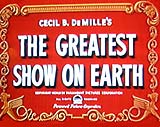


The Greatest Show on Earth (1952), 153 minutes, D: Cecil B. DeMille
Producer/director Cecil B. DeMille's undeserving, overwrought, splashy, star-filled Technicolored, Best Picture winning epic was actually a quasi-documentary and soapy showbiz melodrama about life (involving love, jealousy, and competing one-upmanship and rivalry amongst the circus folk) behind the scenes of the Ringling Bros. and Barnum & Bailey Circus - with three interwoven plot lines. The film's opening included voice-over narration (by director DeMille) about the spectacular pageantry of the "Greatest Show on Earth" - described as a "massive machine" involving 1,400 employees. To save the circus financially and preserve hundreds of jobs, the hard-working and earnest circus manager and ringmaster Brad Braden (Charlton Heston) was forced by the show's stingy board of directors to hire world-class trapeze artist The Great Sebastian (Cornel Wilde), known as "the Debonair King of the Air." The dashing, conceited foreign circus performer made a dramatic entrance in a speeding sports car with a police escort (and sirens blaring). During the film's story, makeup-wearing Buttons the Clown (James Stewart) was slowly revealed to be hiding a dark secret about his past life as a medical doctor who had 'mercy-killed' his wife and was a wanted man. The mysterious character gave early hints to his secret past, and also demonstrated unusual skill in bandage wrapping that he claimed he had learned as "a pharmacist's mate." A competitive romantic triangle with discord soon developed between Holly, her unaffectionate and distracted boyfriend Brad, and the womanizing, roguish ladies' man Sebastian. With the arrival of the world-class trapeze performer, Holly was ousted from being the star attraction in the center ring. During high-stakes competition between the aerialists in a dramatic scene, Sebastian (who had removed his safety net) experienced a high-flying fall during his circus act. Although seriously injured, he asked Braden for a favor: ("Walk me off. Do not rob me of my exit"). Subsequently, Holly returned as the star of the center ring (and she became Sebastian's love interest when she blamed herself for the tragic incident). The conflict within an on-going love triangle was also displayed when elephant girl red-head Angel (Gloria Grahame) fell for Braden, causing jealousy in her boss-trainer boyfriend Klaus (Lyle Bettger). During the show, he threatened to command a jumbo elephant to smash her face with its giant foot. He was subsequently fired by Braden from the show. The film's catastrophic highlight was the scene of a spectacular circus train wreck, sending train cars off the tracks, and releasing wild animals from their smashed cages. Buttons was compelled to reveal his secret past in order to perform a life-saving blood transfusion between Sebastian and the critically-injured Brad who was profusely bleeding from a ruptured artery. Buttons was arrested by Special FBI Agent Gregory (Henry Wilcoxon) who had been on his trail for awhile, for killing his terminally-ill wife. In the triumphant and exciting ending after the loss of property in the train wreck, a circus parade was led by Holly; she had taken charge and had promoted the improvised, open-air circus (without a tent) for the town with a massive parade down the main street to the circus grounds.


High Noon (1952), 85 minutes, D: Fred Zinnemann
Fred Zinnemann's classic and tense black and white revisionist Western (shot virtually in 'real-time') has frequently been interpreted as a parable (or allegorical tale) about artists left to "stand alone" and face persecution and accusations of being Communist during the HUAC Hollywood blacklisting of the McCarthy hearings in the early 1950s. The legendary western provided a masterful portrayal of a deserted, newly-married and retiring Marshal Will Kane (Oscar-winning Gary Cooper) left alone in the western town of Hadleyville (in the New Mexico Territory) in the mid-1870s, pitted against three vengeful gunslingers led by gang-leader Frank Miller (Ian MacDonald). The principled lawman awaited a suspenseful, fateful showdown with ruthless bandits returning to the small town to seek revenge. The film was enhanced by Dimitri Tiomkin's title ballad "Do Not Forsake Me, O My Darlin'" (sung by Tex Ritter). The middle-aged Kane had just been married to pacifist Quaker bride Amy Fowler (Grace Kelly) at 10:35 am, when he learned that a mean outlaw (that Kane had sent to prison five years earlier) had just been pardoned by liberal abolitionists and released, and was arriving in town at noon on the train to meet up with his gang, including Miller's younger brother Ben Miller (Sheb Wooley), Jack Colby (Lee Van Cleef in his film debut), and James Pierce (Robert J. Wilke). Kane had left town with Amy for a new life in nearby Clarksburg, to raise a family, but a few miles out of town, Kane had second thoughts: "It's no good. I've got to go back, Amy...They're making me run. I've never run from anybody before," and they rode back to town. Back in the Marshal's office in town, Amy begged her resolute new husband to reconsider: ("Don't try to be a hero. You don't have to be a hero, not for me"). Then, she defiantly handed him an ultimatum on her wedding day: if he wouldn't go away with her, she would go alone by train to St. Louis - on the one that departed at twelve noon. Much of the film was composed of Kane's agonized wait for the noon train - with numerous, repetitive, large closeup views of clocks ticking in 'real time'; with integrity and a strong sense of justice, duty, and loyalty, he placed everything on the line. Judge Percy Mettrick (Otto Kruger) who had sentenced Miller and officiated at Kane's marriage, was found packing his bags to 'forsake' the community, and urged Kane to do the same. In the local church, Kane delivered a beleaguered plea as he sought to enlist deputies and gain support to help him defend the town against vengeful gunslingers about to arrive. One of the influential spokespersons in the church, the town's Senior Selectman and Mayor Jonas Henderson (Thomas Mitchell) concluded by advising Kane to flee town for the good of the local economy. Kane left the church empty-handed, and then visited the house of aging, discarded, arthritic, and embittered ex-marshal Matt Howe (Lon Chaney, Jr.), Kane's predecessor, who offered his cynical opinion to Kane about his past profession as a life-long 'tin-star' lawman. Kane realized that he would be left single-handed to face the desperadoes. Functioning as the ex-mistress of both Frank Miller and Kane, and as Harvey Pell's current girlfriend, the worldly-wise, half-Mexican saloon owner and businesswoman Helen Ramírez (Katy Jurado) at the Ramirez Saloon had just negotiated to sell her saloon before quickly departing from town; in the hotel, she met Amy and advised her to not abandon her husband. In the town's livery stable, Kane engaged in a vicious fist-fight with his embittered, cowardly young ex-deputy Harvey Pell (Lloyd Bridges) who had earlier attempted to manipulatively blackmail him into succeeding him as the next Marshal in exchange for helping to defend the town. Anticipating his own death at a few minutes before twelve 'high noon,' Kane wrote his own last will and testament in his office; he heard the noon train's whistle from afar. A long, upward-moving crane shot pulled back, revealing the Marshal's forsakenness amidst the storefronts and rooftops of the small community. In the exciting final shootout, Kane confronted the four desperadoes at noon who walked into town from the station. Early on, Kane shot and killed Ben Miller on the street and then from a barn's hayloft, he shot and killed Colby, but was wounded (shot in the left arm) when he fled from the burning barn. Unbeknownst to Kane, Amy (who was on her way back to town from the train station) came to her husband's aid. She gunblasted Pierce from behind through a broken window, but then, after being grabbed by Frank Miller as a hostage, Amy fought him off by clawing at his face and was pushed to the ground. With a clear shot, Kane killed Miller and then relieved that it was all over, he embraced Amy. In the film's conclusion after vanquishing the killers, Kane disavowed the ungrateful town by contemptuously throwing his star-shaped badge into the dirt at his feet, and then rode off in his packed buckboard wagon with Amy. The contemptible crowd that was unwilling to fight to preserve its law and order remained silent as the buckboard went out of view, accompanied by the first words of the title song 'High Noon's' famous melancholy ballad: ("Do not forsake me, oh my darlin'...").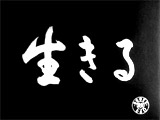
Ikiru (1952, Jp.) (aka To Live), 143 minutes, D: Akira Kurosawa
Akira Kurosawa's humanistic, existential, and poignant drama (the title meant: "To Live") told about a terminally-ill man who went searching for life's purpose and meaning. The film was divided into two distinct parts: the first was about the male protagonist's wasted life, and the second was a series of non-chronological flashbacks and memories at the protagonist's funeral-wake service. The unemotional, rather dull, longtime, low-level petty bureaucrat Kanji Watanabe (Takashi Shimura) was a widower with an estranged and greedy son Mitsuo (Nobuo Kaneko) that he had raised. For at least three decades, Kanji had worked as a disagreeable and spirit-lacking Tokyo City Hall office chief and civil servant (in the position of Public Affairs Section Chief) in the same monotonous, rubber-stamping job. Kanji Watanabe learned of his imminent death (forecast within a year) due to stomach-gastric cancer (seen in the opening shot of his X-Ray). Devastated by the unexpected news (although the doctor, to lighten the blow, gave him a modified and less serious diagnosis of an ulcer), he reacted in a depressed, head-down position as he left the hospital, where he was nearly killed by a truck with a blaring horn. Upon his return home, he accidentally eavesdropped on a conversation between his son and daughter-in-law Kazue (Kyoko Seki) who spoke of their impatience with acquiring Kanji's pension and inheritance in order to purchase a home of their own - it was another despairing blow to his life. The news of the probable, impending end of his life caused Watanabe to reevaluate what his life had meant in his few remaining months. He began a search for meaning, first calling in sick to work, while 'enjoying life' by drinking and frequenting hooch, striptease and pachinko gambling parlors and other dark locales of the underworld of Tokyo nightlife. On his nocturnal journey, he was guided by a dead-beat, eccentric, black-clad writer-novelist whom he met in a bar - self-described as Mephistopheles (Yunosuke Ito). In a Tokyo 'red-light district' nightclub, the despairing and drunken Watanabe symbolically sang "Gondola no Uta" - a 1915 dirge song with lyrics about the fleeting nature of youth, missed opportunities, and the rapid aging process. He also briefly became close friends with cheerful and exuberant younger employee Toyo Odagiri (Miki Odagiri), the only female staffer in his office. She had just resigned from her life-sapping job, and inspired him to make a mark with his own life. She also urged him to quit his job as she had. Eventually, she explained to him how she had found fulfillment in the fast-paced industrial society via her new job - making toy rabbits for Japanese children. Kanji was inspired to make an uncharacteristically generous, worthwhile and socially-motivated decision to support the Kuroe Women's Asssociation's city project to transform a garbage dump-sewer area in the slum district into a playground and park for children - it would be his final triumph to support and promote the project that had been stalled and diverted due to the bureaucracy, and the counter-efforts of the local yakuza to turn the area into another profitable 'red-light' district. In the second instance of singing the dirge song (on the night of his death, 5 months after his diagnosis), Watanabe was joyfully rocking slowly back and forth on a swing in his newly-constructed park during a light snowfall (it also served as flashback to a policeman finding his body). In the second part of the film after Watanabe's death, there were varying reactions and cynical, judgmental and gossipy comments from his shallow bureaucratic co-workers (who were freely drinking sake at the wake) about his passionate, socially-productive act, with some exhibiting contempt, conjecture, inspiration, credit-claiming, jealousy, suspicion, confusion, and frustration over the park project. However, the grieving Kuroe Women's Society gratefully attended the funeral to pay their respects. At the wake, Kimura (Shinichi Himori), the only civil servant in Kanji's office who seemed truly inspired by his example, was afterwards quickly stifled and sternly repressed at the office for acting out of place and wanting to support another oppressed group seeking help. In the film's final ambiguous frames, it was unclear whether Kimura's newfound convictions would be realized.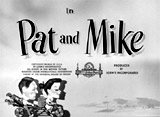


Pat and Mike (1952), 95 minutes, D: George Cukor
Director George Cukor's sports-related romantic comedy, about an apparently mis-matched and unlikely couple who would beat the odds and become a romantic partnership, was the 7th of 9 films (from 1942-1967) featuring Spencer Tracy and Katharine Hepburn. The opening sequence introduced widowed, independent and smart, outdoorsy college phys-ed instructor and Pacific Technical College coach Pat Pemberton (Katharine Hepburn) during a foursome golf game. She had been partnered with Mr. Beminger (Loring Smith) who was being groomed to be a college donor, while matronly Mrs. Beminger (Phyllis Povah) was playing with Pat's overbearing, pompous and demanding fiancée Collier Weld (William Ching) - a college administrator. Pat was encouraged to play her best and win with her partner. Whenever in the presence of a very reproachful, highly-critical Collier, however, Pat would become overly nervous and develop an inferiority complex. During the game on the golf course, she played poorly and was criticized for her lack of coordination. She was advised to tense up her gluteal muscles in order to help her golf-stance by a screechy Mrs. Beminger. Following a condescending barrage of golf tips, Pat responded by twice pushing her into a chair before hitting nine teed-up golf balls in a row to impress her. She struck nine golf balls with perfect drives and then told off Mrs. Beminger. Pat was invited to play in the Women's National amateur championship (one of her opponents was famed female golf player Babe Didrikson Zaharias). One of the attendees who marveled at Pat's play - and was pursuing her as one of his potential clients, was unscrupulous, rough-hewn, seedy sports promoter Mike Conovan (Spencer Tracy), who suggested that he could become her manager. Pat lost the tournament on the last putt due to Collier's presence, and then thought she might reconsider Mike's offer to manage her (he was also willing to promote her other sports skills - as a tennis player and target shooter); she met with Mike in his New York office, and signed a contract with him to represent her. As her confident manager, he took over her rigid training schedule and imposed various rules - no liquor, cigarettes, late hours or interaction with Collier (who always compelled her to lose). During a tennis tournament in San Francisco at the Cow Palace, Pat was excelling as the headliner until one afternoon, Collier attended. Pat suddenly broke down as she delusionally imagined the tennis net getting higher, while her racket was shrinking in size. She fainted on the court in the middle of her match. After overcoming many hurdles in their relationship (including her persistent fiancée, crooked racketeering gamblers who attempted to beat up Mike and pressured Pat to throw a golf tournament, and a jealous, dim-witted boxer named Davie Hucko (Aldo Ray)), Pat became a well-known, nationwide sports celebrity. Their concluding decision was to work together. Pat suggested that Mike take care of her, and that they could team up romantically. He responded affirmatively: "I don't know if I can lick you, or you can lick me, but I'll tell ya one thing I do know. Together, we can lick 'em all." They shook hands on a partnership (and agreed to get married), and he was there for her when she won a major golfing tournament event on her last putt.


The Quiet Man (1952), 129 minutes, D: John Ford
John Ford's Irish romantic comedy/drama was a Taming of the Shrew tale - lushly filmed on location. It told about an American ex-prizefighter Sean Thornton (John Wayne) who retired to his native, childhood Ireland (the greenish town of Inisfree) to begin a new life and escape from his past. He was escorted and aided by the impish, leprechaun-like matchmaker and carriage taxi-driver Michaeleen Flynn (Barry Fitzgerald). Sean was introduced to the local Irish priest Father Lonergan (Ward Bond), and was shown his mother's former cottage, his ancestral Thornton home, as well as the local pub. After eyeing a beautiful Irish lass - the fiery, red-haired, strong-willed Mary Kate Danaher (Maureen O'Hara), a poor shepherd girl, he asked himself: "Hey, is that real? She couldn't be." Sean was cautioned about having a romantic interest in her, but he was determined to court her. He found himself at odds with Mary Kate's rough, bullying, grudge-holding and disapproving older brother Will 'Red' Danaher (Victor McLaglen), who was also competing with him to purchase the home from the town's well-respected, wealthy widow Sarah Tillane (Mildred Natwick). The formal rules of courtship in the land dictated that drunken matchmaker Michaeleen Flynn had to formally present Sean Thornton's proposal of marriage to Mary Kate. Sean did not care about her lack of fortune or poverty, but she was fiercely adamant about refusing to give up her possessions (her dowry and other precious heirlooms). When Will Danaher was asked to consent and approve Mary Kate's courtship and marital intentions, because their father was deceased - he flatly refused. A conspiratorial plot was therefore devised by townsfolk including Michaeleen, Reverend Playfair (Arthur Shields), and the parish priest Father Lonergan. They spread the rumor that Will could quickly marry the widow Tillane if he let Mary Kate marry Sean. Soon after, Will gave his consent to Sean's and Mary Kate's courtship, and they were married. After the formal ceremony, Will Danaher then took the floor to announce his romantic intentions for widow Sarah Tillane, but learned that he had been fooled. He reneged on Mary Kate's promised dowry of 350 Irish pounds and precious heirlooms. Further major conflict developed between the couple when Mary Kate falsely perceived that Sean wouldn't fight for her dowry and possessions. When Sean was punched and downed by Will, he experienced a disquieting and troubling flashback of his guilty secret - a memory of his last prize fight back in the US, where he was known as "Trooper Thorn" when he killed his opponent in the ring (in his flashback, his dead opponent appeared to be Will Danaher). Sean refused to fight back, thus appearing weak to Mary Kate. On their wedding night, she told him that she would not consummate her love for him until she had her dowry, and she rejected his romantic advances. Although Mary Kate's furniture and possessions were delivered to the house, the dowry was still missing and Mary Kate demanded that Sean demand her money from her brother. When the ashamed Mary Kate decided to leave town for Dublin by traveling to the Castletown train station when Sean wouldn't fight for her, Sean pursued her, caught up to her, dragged her out of a train car, and continued to pull her five miles across the fields back to the Danaher farm - with a crowd of spectators following behind them. Sean successfully delivered an ultimatum to Will Danaher and obtained Mary Kate's 350 pounds. However, Sean didn't really care about the money and proceeded to burn it in the furnace of a threshing machine - Danaher stepped forward to protest the money's destruction - and thus commenced a lengthy, epic marathon, brawl/fist-fight scene in the Irish town - all the way from the Danaher farm to the village, interrupted by bouts of drinking. Afterwards, Will was even invited into Sean's house for supper prepared by Mary Kate. In the film's tranquil and satisfying conclusion, Will Danaher and the Widow Tillane were courting each other, and Mary Kate whispered a sexy secret in Sean's ear while beckoning him to join her in the cottage.

Rancho Notorious (1952), 89 minutes, D: Fritz Lang
Director Fritz Lang's third (and last) western (after The Return of Frank James (1940) and Western Union (1941)) was a quirky, noirish, dream-like, Technicolored frontier revenge western for RKO Pictures, with a distinctive, stylized (set-bound) story with perverse Freudian overtones. The film's opening thematic ballad and recurring song during the opening credits was "Legend of Chuck-a-Luck" - emphasizing the refrain of "Hate, Murder, and Revenge" - the deadly forces of fate, the uselessness of revenge, and murder. [Note: Chuck-a-Luck referred to a roulette-style gambling game, both a gambler's vertical wheel and the Wheel of Fate.] In the first sequence, in the town of Whitmore, WY in the Assayer's Office (part of the General Store), cattle ranch-hand Vern Haskell (Arthur Kennedy) and his sweetheart Beth Forbes (Gloria Henry) - who worked in her father's store, were to be married in 8 days. Before Vern left, he presented his fiancee with a beautiful, jewel-studded brooch ("Came from Paris in France"). Shortly later, Beth was shockingly raped and murdered (off-screen) by one of the two riders (deadly outlaw Kinch (Lloyd Gough)), after Beth was forced to open the Assayer's office safe to bags of money. Vern went on a vengeful pursuit of the two culprits with a sheriff's posse and then proceeded on his own. He found a mortally-wounded Whitey (John Doucette), the long, white-haired partner of the murderer, who had been shot in the back after a quarrel over the stolen money by his double-crossing partner Kinch. As Whitey died, he was given a clue to Kinch's destination - Chuck-a-Luck, the name of a casino game. During Vern's long and relentless search for Beth's surviving outlaw killer, he finally realized that the clue referred to a hideout managed or run by notorious, aging dance-hall girl Altar Keane (Marlene Dietrich). He also learned that Keane was associated with infamous and handsome gunslinger-sharpshooter Frenchy Fairmont (Mel Ferrer), who had helped her win big at the 'Chuck-a-Luck' roulette wheel. To learn more about Altar from Frenchy, Vern deliberately had himself jailed on election day (by shooting up a saloon to get a prohibited drink) in order to befriend Frenchy who was incarcerated in the town of Gunsight. Afterwards, he helped to orchestrate their escape and the two proceeded to a secluded horse ranch near the Mexican border, a safe haven for outlaws - it was named 'Chuck-a-Luck.' She harbored thieves, cattle rustlers and killers in exchange for 10% of the proceeds of their crimes. After a love triangle of sorts developed between Frenchy, Keane, and Vern, on the night of her birthday celebration, Vern noticed Keane was wearing the jewel-studded brooch (on her fancy gown) that he had given to Beth moments before her death. Presumably, someone at the ranch was Beth's killer. From then on, Vern attempted to ingratiate himself to Keane and romance her, to betray her knowledge of the killer (against the code of the ranch which required "no questions asked"). She finally divulged that Kinch was the hideout's murderer: "Kinch gave it to me" - and Vern became filled with anger. In a bar, he confronted Kinch and challenged him to a gunfight stand-off, but Kinch wouldn't draw his gun. The killed was saved when Vern was jailed by the local sheriff. After a jailbreak, a climactic showdown followed at 'Chuck-a-Luck' between Frenchy and Keane (joined by Vern) against Kinch and all the other outlaws including Wilson (George Reeves). The outlaws had ganged up when they feared that Keane was going to betray all of them. In the concluding gunfight, Kinch was killed (by Frenchy), Wilson was shot dead (by Vern), and Keane was mortally wounded when she shielded Frenchy and took a bullet for him in the chest. She died on her bed between Vern and Frenchy. Now alone, Frenchy rode off with Vern.

Singin' in the Rain (1952), 103 minutes, D: Gene Kelly and Stanley Donen
Gene Kelly's, Stanley Donen's and MGM's classic film musical was a perfect example of an organic, 'integrated musical' in which the story's characters naturally expressed their emotions in the midst of their lives, with song and dance replacing the dialogue. It was one of the all-time best and most enjoyable of Hollywood musicals, produced by the Freed Unit. Tthis colorful and appealing film spoofed and satirized the transitional chaos surrounding the end of the silent film era and the dawn of the 'talkies.' During the opening credits, the three stars danced in bold yellow raincoats and sang the title song "Singin' in the Rain." In the film's opening, vaudeville, egocentric silent film actor/dancer Don Lockwood (Gene Kelly) and his vain, empty-headed, shrill, nasal boiced, blonde co-star actress Lina Lamont (Jean Hagen) were attending their Monumental Pictures' 1927 film premiere held at Grauman's Chinese Theatre in Hollywood. The film was their latest romantic, black and white swashbuckler, The Royal Rascal. Both were at the height of their box-office popularity. On his way to a post-preview party after leaving the theatre's film premiere, Don met pretty young ingenue Kathy Selden (a pert 19 year old Debbie Reynolds in her first major role), a young, bouncy, flapper - an aspiring, fresh-faced and enthusiastic actress. At a post-preview party held at studio boss R.F. Simpson's (Millard Mitchell) home to celebrate the premiere, he announced that the studio didn't have to worry about competing with the advent of sound heralded by Warners' full-length sound picture The Jazz Singer (1927). Simpson soon changed his mind after the success of Warners' talking picture a few weeks later; his stars were pressured to change their next silent romantic drama (The Duelling Cavalier) and make it their first sound picture. Don's wise-cracking pal Cosmo (Donald O'Connor) attempted to cheer Don up, because he was an actor and 'the show must go on.' Cosmo performed a wacky but memorable sequence - an amusing, acrobatic, highly energetic tour-de-force number, entitled "Make 'Em Laugh." In the studio, silent film hero Don was delighted and thrilled to see Kathy again, and made his peace with her, but he was tongue-tied with words, so he sang and danced a fabulous love duet with her on an empty sound stage: "You Were Meant for Me," in which he declared his love to her. In scenes of comic exaggeration, making fun of the problems Hollywood faced with the coming of sound, Don and Lina were both ordered to take diction lessons from an elocution coach, memoralized by the song "Moses Supposes" between Don and Cosmo. The filming of the sound version of the film The Duelling Cavalier was one of the high points of the film; the problems of placing hidden microphones on the set and filming with bulky cameras in the early talkies was comically illustrated; Lina made a disastrous attempt to speak into a concealed microphone. The revised film turned out laughable before studio preview audiences, due to unsynchronized and uneven sound, and Lina's ghastly ungenteel voice. Depressed by the preview, fellow conspirators Don, Cosmo and Kathy discussed their problems later that drizzly evening during an all-night talk session. It ended in the early morning with the marvelously upbeat production number "Good Mornin'" after Don had received helpful advice from his dance partner and friend Cosmo Brown and his ingenue girlfriend Kathy Selden. Their idea was to recruit Kathy to rescue and salvage the film - by secretly dubbing over Lina's uncouth voice ("She can't act, she can't sing, and she can't dance, a triple threat...Use Kathy's voice. Lina just moves her mouth and Kathy's voice comes over singing and talking for her"). The disastrous costume drama would become a musical swashbuckler titled The Dancing Cavalier. In a classic, unforgettable, heart-lifting, enchanting dance scene during a cloudburst in the middle of the night after taking Kathy home, Don performed a glorious and joyous, almost five minute rendition of the title song "Singin' In the Rain" - it was a spontaneous expression of his crazy-in-love, euphoric mood and love-struck happiness over his new-found love for Kathy. In the rain dance during a downpour, he passed by shop windows, splashed through puddles, and stood on a streetlamp - with his trusty umbrella; it ended with a policeman's quizzical look after Don tipped his hat. The next day, Don and Cosmo explained their saving idea to Hollywood studio head R. F. Simpson. The Duelling Cavalier was to be renamed The Dancing Cavalier and the plan was to include large-scale musical numbers within the film. Kathy's dubbed voice would be superimposed onto the soundtrack. During the film's production, Don also explained what the film needed to Simpson - he suggested a large, modern, dance number that would be inserted into the sound film. It became the film's largest and lengthiest segment titled "Broadway Melody Ballet." It was comprised of a show-business rags-to-riches story of a young hoofer's success on Broadway, featuring a seductive dance by a gangster's moll portrayed by guest dance artist Cyd Charisse; although Simpson agreed to the idea of making the film a musical, he wasn't so sure about Don's extravagant idea. The newly-envisioned sound film was a tremendous success, and Lina's career was saved, when Kathy had her voice substituted for all of Lina's lines and songs. However, the voice-dubbing deception was ultimately exposed during The Dancing Cavalier's premiere (advertised as "ALL SINGING, ALL TALKING, ALL DANCING"), at Grauman's Chinese Theatre. Lina was embarrassed in front of the audience and laughed off the stage at the film's premiere when she was unable to duplicate the film's singing style in a live performance and appearance onstage. Kathy was revealed to be the true singer behind her, substituting for Lina's voice. As the embarrassed Kathy fled up the theatre aisle, Don from the stage shouted "Stop that girl", and then he told the audience: "That's the girl whose voice you heard and loved tonight. She's the real star of the picture. Kathy Selden." Don started to sing to her: "You Are My Lucky Star" as she returned to the stage and they embraced. Afterwards, the two hugged in front of a billboard on a hillside announcing their new starring roles as the new stellar love team of Monumental Pictures, as romance blossomed between Kathy and Don.

Umberto D. (1952, It.), 91 minutes, D: Vittorio De Sica
Director Vittorio De Sica's neo-realist, classic Italian New Wave was a sentimental and heartbreaking melodramatic tearjerker, and a poignant character study of a man tragically pushed to his limits. In the film's opening, elderly pensioners chanted and carried signs as they protested in the streets of central Rome, but were dispersed by the police for not having a permit. One of the protestors was destitute, elderly, retired government worker/pensioner Umberto Domenico Ferrari (Carlo Battisti) who faced financial ruin - he was a lonely senior citizen with no family or close ties, who had worked for 30 years as a clerk for the Ministry of Public Affairs. In a local soup kitchen, Umberto snuck food to his faithful pet dog Flike from his plate. His meager monthly fixed-income pension was slashed, and his heartless, callous and tyrannical landlady Antonia Belloni (Lina Gennari) (with self-absorbed aspirations to be in show business) of ten years threatened to evict him at the end of the month from the boarding house, and rent out his room to prostitutes and other couples for quick sex. The only truly close friends and dependent relationships Umberto had were with his faithful spotted terrier pet Flike, and with teenaged, caring, and sympathetic 3-months pregnant house-maid Maria (Maria Pia Casilio). She was unsure if the father of her child in the Italian military was from Florence or Naples. In one transcendent scene that followed her early morning routine, Maria (who was facing a difficult future too, if the landlady found out she was pregnant) roused herself out of bed to perform her menail chores, including grinding coffee beans in the kitchen. After a case of tonsillitis and a few days in the comfort of a Catholic-run charity infirmary, Umberto returned to his apartment building to find his room being destroyed during renovations. Maria had taken care of Flike during his absence, but she confessed that Flike had disappeared through an open apartment door and had run off (had the landlady spitefully let the dog out?). Fortunately, Flike was located in the local pound and the two were overjoyed with being reunited. In the film's tearjerking, ambiguous ending, without any money and feeling distraught and defeated with nowhere to turn, the hopeless Umberto packed up his room and departed: ("I have no one, no son or brother, to help me out. I'm just a good-for-nothing old man"). After numerous failed attempts to give his dog away (rather than cruelly abandoning it), Umberto became desperate but still remained calm and logical. Homeless and penniless with no monetary sources (and hateful of turning into a shameless beggar or debtor), Umberto contemplated suicide by stepping in front of a speeding train near a park while holding Flike -- the frightened dog yelped, wriggled and squirmed away before Umberto could step in front of the train, and for the first time, ran away in abject fear from his beloved master. Umberto pursued after Flike, and coaxed the forgiving Flike back to him by having the dog perform tricks with a pine cone: ("Flike, look at the pinecone. Come on, here, boy. Come on, stand up"). He played with the dog (trained to stand on its hind legs) in a long shot as the film ended, despite having no place to stay and no income.